How Fleet Management Systems Reduce Operating Costs
Table Of Content
Published Date :
02 Oct 2025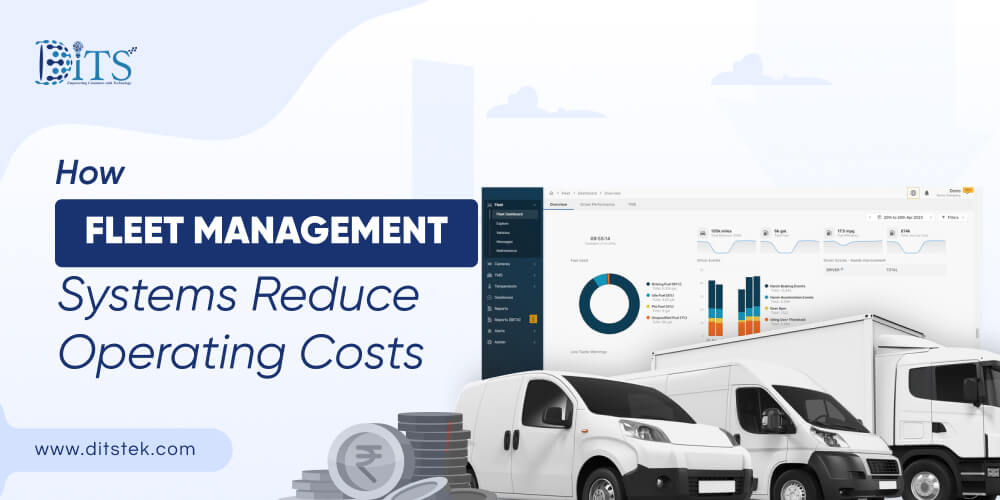
In today’s transportation industry, operating expenses are climbing faster than ever. Fuel prices fluctuate, maintenance bills pile up, and administrative compliance adds another layer of cost. For businesses running fleets—whether small delivery vans or large logistics operations—the need to manage expenses effectively is no longer optional, it’s essential. This is where modern technology comes in.
Before diving deeper, let’s clarify what is fleet management software. At its core, it’s a digital system that helps businesses monitor vehicles, track driver behavior, schedule maintenance, and optimize routes. When implemented correctly, it becomes a powerful tool for financial efficiency.
The big question business owners often ask is: how fleet management software reduce operational costs? The answer lies in its ability to provide data-driven insights, streamline day-to-day tasks, and ensure every vehicle and driver is operating at peak performance. By minimizing waste and improving efficiency, businesses can achieve significant savings without compromising service quality.
This blog will explore how businesses can tackle key cost drivers—fuel, maintenance, compliance, and productivity—while also highlighting practical strategies on how to reduce operational costs with the help of smart fleet management systems.
Understanding the Key Cost Drivers in Fleet Operations
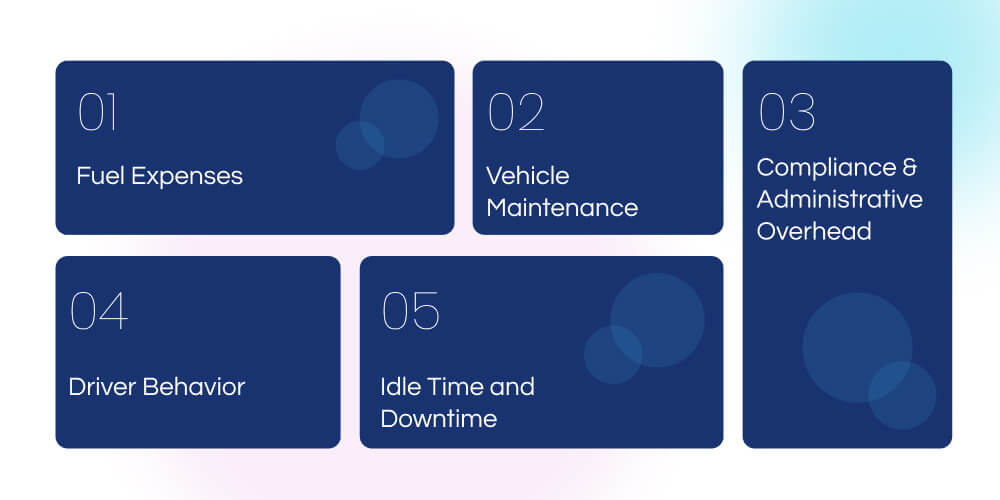
Every business owner in the transportation sector knows that the bulk of operation costs comes from a handful of recurring factors. By understanding these cost drivers, it becomes easier to identify where savings can be made and how technology can support better decision-making.
Fuel Expenses
Fuel is often the largest recurring cost in fleet operations. Poor route planning, excessive idling, and inefficient driving habits quickly add up, draining profit margins. Without a monitoring system, these inefficiencies remain hidden.
Vehicle Maintenance
Breakdowns don’t just mean repair bills—they also bring downtime and missed deadlines. Reactive maintenance often costs more than planned, proactive servicing, making maintenance a critical area for cost control.
Driver Behavior
Speeding, harsh braking, and over-acceleration increase fuel consumption and wear out vehicle parts faster. Driver behavior also directly affects safety, which impacts insurance premiums and liability expenses.
Idle Time and Downtime
Idle vehicles aren’t generating revenue. Whether stuck in traffic, waiting for loads, or sidelined due to breakdowns, downtime eats into productivity and profitability.
Compliance and Administrative Overhead
Non-compliance with safety or regulatory requirements leads to heavy penalties. Additionally, manual paperwork and fragmented reporting consume time and resources that could be better utilized elsewhere.
By pinpointing these cost drivers, businesses can set the stage for targeted improvements and explore effective strategies on how to reduce operational costs through modern fleet management systems.
Want to Slash Rising Fleet Expenses?
Discover proven strategies on how to reduce operational costs and gain lasting efficiency for your fleet operations today.
Fuel Efficiency Through Smart Monitoring
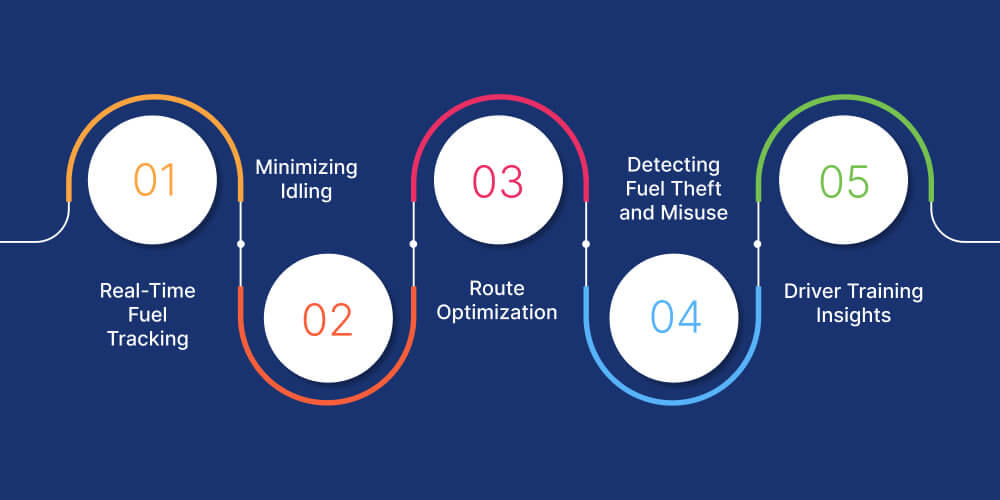
Fuel consumption is one of the most challenging areas for fleet operators to manage. Without clear visibility, it’s nearly impossible to identify the reasons behind unnecessary expenses. This is where technology makes a measurable difference.
Real-Time Fuel Tracking
Fleet management systems provide detailed data on how much fuel each vehicle is consuming. With this insight, managers can quickly spot anomalies and take corrective action before costs escalate.
Minimizing Idling
Excessive idling is a hidden expense. Smart monitoring tools flag when drivers keep engines running unnecessarily, giving businesses the opportunity to implement better practices that directly reduce operational costs.
Route Optimization
Choosing the right route is not just about saving time—it’s also about saving fuel. With GPS and advanced mapping features, vehicles can avoid congestion and minimize mileage, improving overall efficiency.
Detecting Fuel Theft and Misuse
Unaccounted fuel losses can severely impact margins. Monitoring systems alert managers of suspicious refueling patterns or consumption spikes, ensuring every drop of fuel is accounted for.
Driver Training Insights
By analyzing fuel-related driving patterns such as harsh acceleration or speeding, managers can guide drivers towards more economical practices, leading to sustainable fuel savings.
When businesses address fuel efficiency strategically, they don’t just save money—they also gain better control over one of the largest contributors to operation costs.
Proactive Vehicle Maintenance and Reduced Downtime
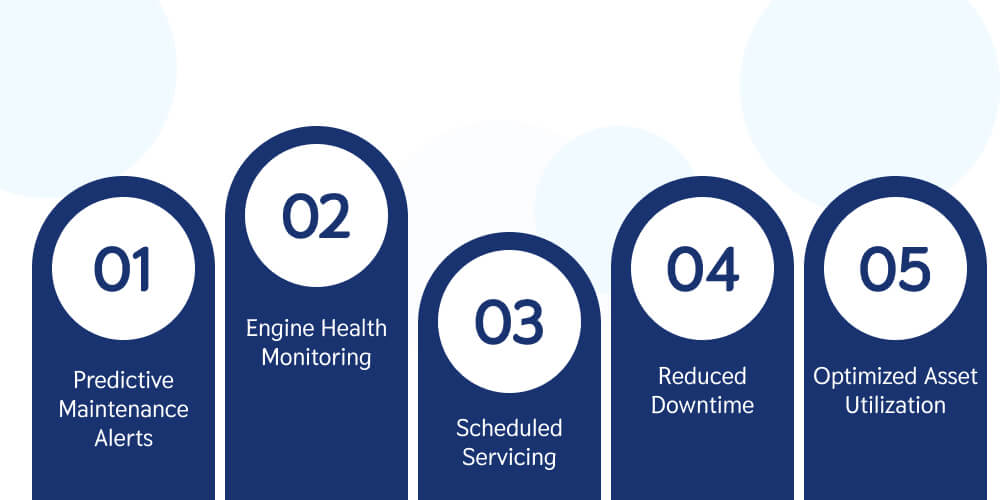
Unexpected breakdowns are more than just a mechanical issue, they can lead to missed deliveries, unhappy customers, and significant financial setbacks. Instead of waiting for problems to occur, fleet management systems empower businesses to adopt a preventive approach.
Predictive Maintenance Alerts
By analyzing vehicle data, these systems can forecast potential issues and alert managers before they escalate. This avoids expensive emergency repairs and ensures vehicles stay road-ready.
Engine Health Monitoring
Continuous tracking of engine performance helps identify early signs of wear and tear. Addressing these promptly extends the lifespan of assets and prevents avoidable replacements.
Scheduled Servicing
Automated reminders ensure vehicles are serviced on time, reducing the risk of breakdowns during critical operations and lowering long-term maintenance expenses.
Reduced Downtime
Planned maintenance not only cuts repair costs but also ensures vehicles remain available when needed most, boosting overall productivity.
Optimized Asset Utilization
Well-maintained vehicles perform better, consume less fuel, and deliver higher reliability—directly contributing to financial savings.
For businesses exploring how to Develop Fleet Maintenance Software, these proactive features are fundamental. When implemented effectively, they transform maintenance from a reactive expense into a strategic tool for lowering costs.
Is Inefficient Routing Draining Your Profits?
See how to reduce operational costs through intelligent routing, driver monitoring, and real-time insights that boost profitability.
Driver Behavior Monitoring and Safety Improvements
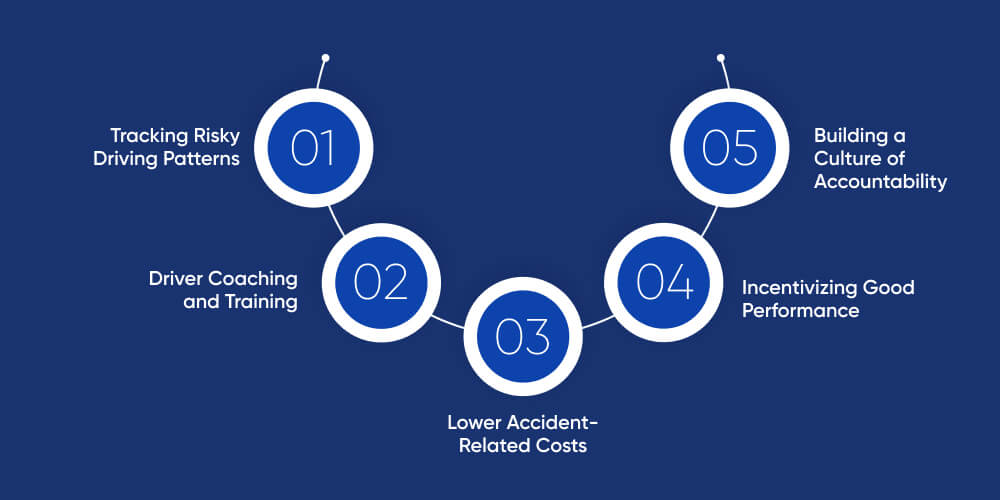
Drivers play a pivotal role in the overall performance of a fleet. Their habits behind the wheel can significantly influence fuel use, vehicle health, and even insurance premiums. By monitoring driver behavior, businesses gain the ability to make improvements that directly impact the bottom line.
Tracking Risky Driving Patterns
Fleet management systems capture data on speeding, harsh braking, and over-acceleration. Addressing these behaviors not only enhances safety but also cuts down on vehicle wear and fuel consumption.
Driver Coaching and Training
Insights from driver reports allow managers to design targeted training programs. These programs help drivers adopt smoother and more efficient driving styles, which translates into reduced expenses.
Lower Accident-Related Costs
Encouraging safe driving reduces the likelihood of accidents. This means fewer repair bills, less downtime, and potentially lower insurance premiums over time.
Incentivizing Good Performance
Recognizing and rewarding drivers for fuel-efficient and safe practices boosts morale while reinforcing the behaviors that save money and improve fleet reliability.
Building a Culture of Accountability
When drivers know their actions are being monitored, they naturally align with company goals, ensuring consistency and efficiency across the fleet.
With technologies like IoT integration, managers can receive real-time driver performance data and take immediate action when risky patterns arise. This ensures safety standards are maintained while also helping the business reduce operational costs linked to poor driving practices.
Route Optimization and Productivity Gains
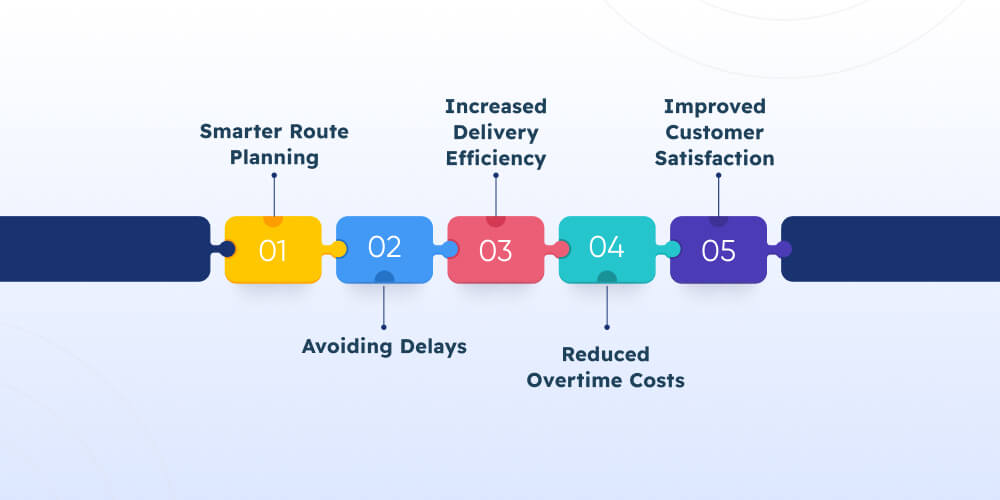
Time is money in the transportation sector, and inefficient routes can quickly erode profits. Fleet management systems leverage advanced tools to ensure vehicles take the smartest path every time, balancing fuel savings with timely deliveries.
Smarter Route Planning
GPS-enabled tools identify the shortest and most efficient routes, reducing unnecessary mileage and cutting down on wasted resources.
Avoiding Delays
By factoring in live traffic data, managers can reroute vehicles to avoid congestion, ensuring drivers stay productive instead of stuck on the road.
Increased Delivery Efficiency
Optimized routes mean more deliveries can be completed within the same time frame, maximizing fleet output without adding more vehicles or staff.
Reduced Overtime Costs
Drivers who consistently reach destinations faster are less likely to require extended hours, helping the business control labor expenses.
Improved Customer Satisfaction
On-time deliveries build trust with customers, strengthen relationships, and support long-term business growth.
This is where transportation & logistics software development shows its actual value. By combining advanced routing capabilities with real-time visibility, businesses not only save fuel but also streamline operations—clear examples of how to reduce operational costs while maintaining high service standards.
Want Predictable Maintenance, Not Costly Breakdowns?
Shift from reactive repairs to proactive management—reduce operational costs and downtime with predictive fleet maintenance insights.
Compliance, Reporting, and Reduced Administrative Costs
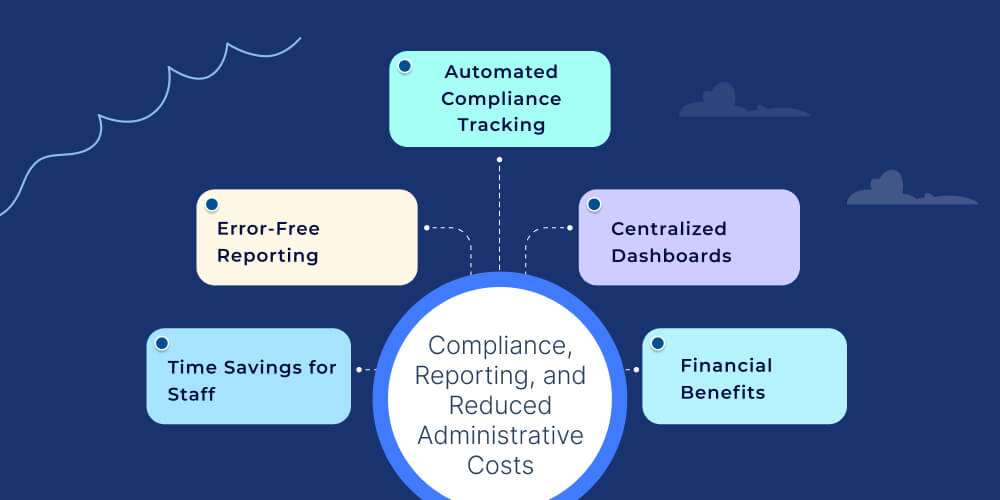
Managing compliance in fleet operations often feels like a never-ending challenge. From safety regulations to environmental standards, even small oversights can result in costly penalties. Fleet management systems simplify this process while also easing the administrative load on back-office teams.
Automated Compliance Tracking
Instead of manually checking logs and forms, systems automatically track regulatory requirements, ensuring businesses avoid fines and legal setbacks.
Error-Free Reporting
By digitizing reports, managers reduce the risk of human error. Accurate reporting not only builds credibility but also saves time during audits.
Centralized Dashboards
With all compliance and reporting data in one place, decision-making becomes faster and more efficient, eliminating the need for scattered spreadsheets.
Time Savings for Staff
Automating paperwork reduces the hours spent on manual tasks, freeing staff to focus on strategic initiatives that drive growth.
Financial Benefits
Lower administrative expenses combined with fewer compliance penalties directly translate into long-term savings.
Thanks to advancements like AI integration, businesses can automate repetitive compliance tasks and maintain accurate reporting with minimal manual effort. At DITS, we go a step further by using AI for software development, quality assurance, code maintenance, and customization—ensuring clients not only meet standards but also stay ahead in efficiency. This holistic approach shows clearly how fleet management software reduce operational costs in both operations and administration.
The ROI of Fleet Management Systems
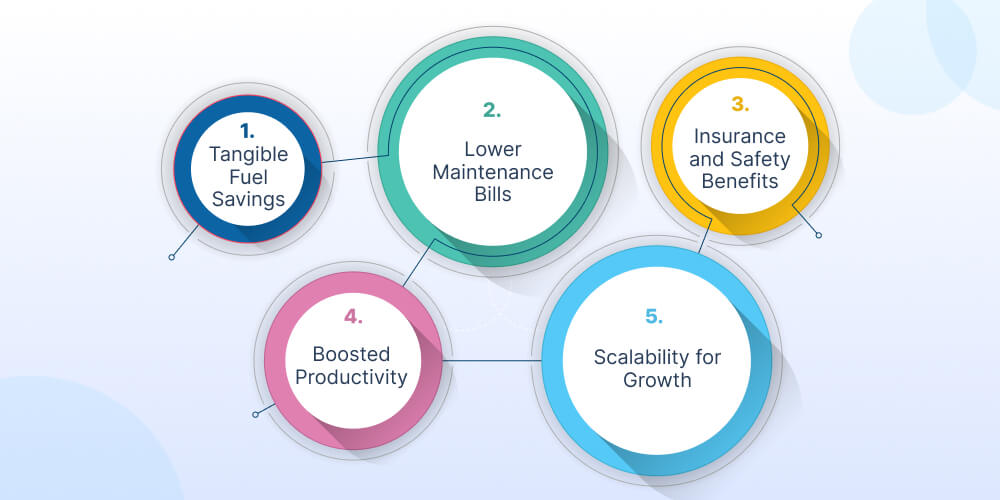
For many business owners, the first thought when considering new technology is the cost of investment. But when it comes to fleet management systems, the numbers tell a very different story. Instead of being just another expense, these systems quickly prove themselves as revenue protectors and profit enhancers.
Tangible Fuel Savings
With optimized routes, reduced idling, and better driver habits, fuel expenses drop significantly—often becoming one of the most immediate cost-saving benefits.
Lower Maintenance Bills
Predictive servicing prevents costly breakdowns and extends vehicle lifespans, reducing the capital needed to replace assets prematurely.
Insurance and Safety Benefits
Safer driving habits not only prevent accidents but can also lower insurance premiums, adding a layer of savings many businesses overlook.
Boosted Productivity
Handling more deliveries or trips with the same number of vehicles directly improves output without inflating operational budgets.
Scalability for Growth
As businesses expand, the system grows with them, ensuring cost efficiency remains intact even when operations multiply in size.
The return on investment doesn’t just appear on balance sheets. It’s felt in smoother workflows, happier customers, and the peace of mind that operations are under control. For businesses serious about learning how to reduce operational costs while staying competitive, fleet management systems are less of a luxury and more of a necessity.
Ready to Cut Fuel and Maintenance Costs?
Learn how modern fleet management technology reduces operational costs and helps businesses achieve measurable savings without compromise.
How DITS Can Help You Reduce Operating Costs
At DITS, we understand that managing a fleet goes beyond tracking vehicles, creating measurable savings and driving long-term efficiency. Our expertise lies in building tailored solutions that directly address your cost challenges.
We design systems that combine predictive maintenance, intelligent route planning, and driver performance monitoring to help businesses cut down unnecessary expenses. With IoT integration, we ensure every vehicle is connected, providing real-time insights that support faster and smarter decision-making.
What sets us apart is our commitment to innovation. We use AI for software development, quality assurance, code maintenance, and customization. This allows us to deliver solutions that are not only efficient but also scalable, future-ready, and highly reliable.
By leveraging our deep experience in fleet management software development, we help clients minimize downtime, boost fuel efficiency, and achieve operational excellence. Whether your fleet is small or enterprise-scale, our goal is simple: to help you run smarter, safer, and more cost-effective operations.
Conclusion
Operating a fleet comes with countless moving parts, and each one carries a cost. From fuel and maintenance to compliance and administration, inefficiencies can quickly chip away at profits if left unmanaged. A fleet management system tackles these challenges head-on, helping businesses monitor, optimize, and improve every aspect of operations.
By focusing on fuel efficiency, preventive maintenance, safer driving, smarter routing, and streamlined compliance, these systems transform everyday processes into opportunities for savings. The result is not just lower expenses, but stronger productivity, improved customer satisfaction, and long-term scalability.
For business owners asking how fleet management software reduces operational costs, the answer is clear: it empowers you to run leaner, smarter, and more profitable operations. Now is the time to explore the right solution and unlock the competitive advantage your business deserves.
FAQs
1. What is fleet management software, and how does it help reduce costs?
Fleet management software is a digital system that monitors vehicles, drivers, and routes to improve efficiency. It helps reduce costs by cutting fuel waste, lowering maintenance expenses, and automating compliance tasks.
2. How quickly can a business see savings after implementing fleet management software?
Most businesses begin noticing measurable savings within the first few months, especially in fuel and maintenance costs. Long-term benefits include extended vehicle lifespan and reduced administrative overhead.
3. Can fleet management systems work for small fleets, or are they only for large companies?
These systems are highly scalable. Small fleets often see significant benefits since even minor savings on fuel, downtime, or repairs can make a noticeable impact on tight budgets.
4. How does driver monitoring contribute to lowering operation costs?
By tracking speeding, idling, and harsh driving, businesses can coach drivers to adopt safer and more fuel-efficient habits. This reduces wear on vehicles, cuts down on fuel, and minimizes accident-related expenses.
5. Why choose DITS for building a custom fleet management solution?
At DITS, we specialize in creating tailored solutions with advanced technologies like IoT and AI integration. Our approach ensures businesses not only manage fleets effectively but also achieve measurable cost reductions and long-term efficiency.

Dinesh Thakur
21+ years of IT software development experience in different domains like Business Automation, Healthcare, Retail, Workflow automation, Transportation and logistics, Compliance, Risk Mitigation, POS, etc. Hands-on experience in dealing with overseas clients and providing them with an apt solution to their business needs.
Recent Posts

Explore predictive maintenance software features that reduce downtime, cut costs, and boost efficiency with enterprise-grade, AI-powered maintenance systems.

Benefits of AI in real estate include better cash flow planning, improved marketing ROI, stronger pipeline visibility, and scalable growth.

We at DITS offer custom Population Health Management Software Solutions to help you measure the effectiveness and efficiency of care delivery to patients. Read our blog to know in detail.